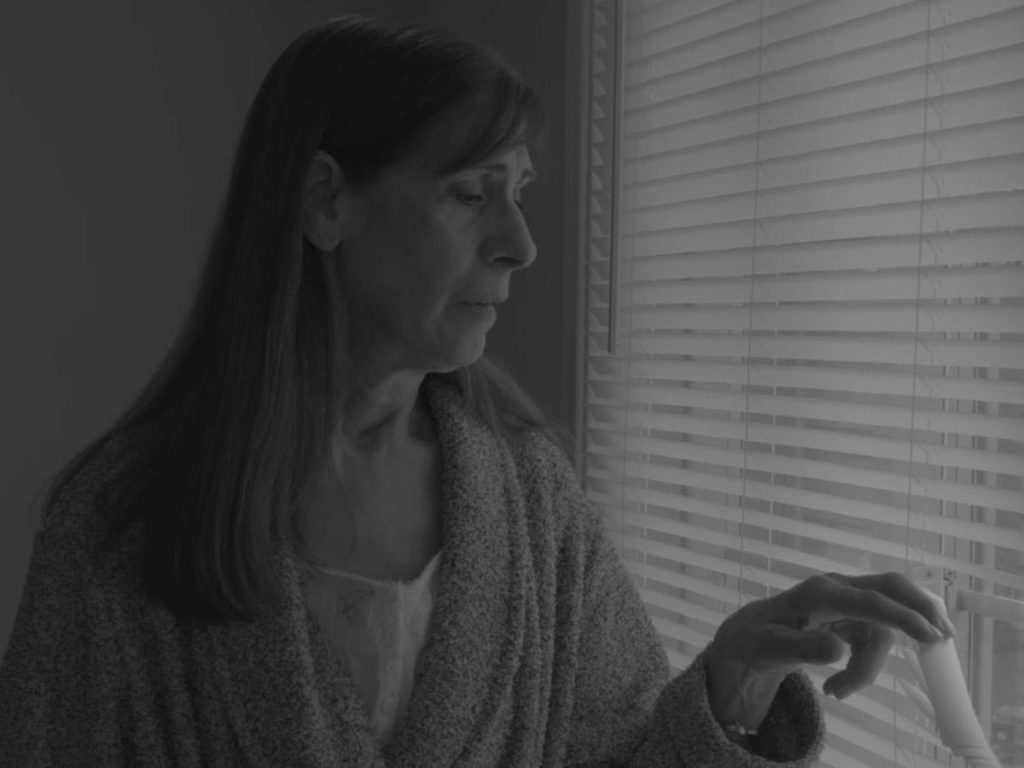Diagnosed with breast cancer, Ms. Davis (Danette Illig) patiently awaits her death as her country and the wider world around her fall down a depraved abyss of moral and social decay. Her caregiver is a kind, young, optimistic woman, full of zeal, and intent on helping Ms. Davis survive her diagnosis. But Ms. Davis has other plans. Or she doesn’t have any. She doesn’t make an appointment with her doctor, she isn’t interested in cures for her condition and instead goes about her days like everything’s alright, casually having conversations with Death (Trey Riley).
With that premise, Richard Schertzer’s film Ms. Davis’ Close Friend, which features a diverse cast, takes an unflinching look at how terminal illnesses affect us and our mindsets. Ms. Davis is still very full of life. She doesn’t mope at all. She plays chess with her caregiver Katie (Kike Ayodeji), has lively conversations with her son, watches the news intently, and approaches her “inevitable” demise very calmly. Death is slightly bothered by her dismissive attitude towards healthcare, but he gradually decides to let her have her way. She finds solace in her quiet life. She enjoys watching the neighbourhood kids with nostalgia for her own youth.
Edited in a style where shots linger for a few seconds after the action is over, the film feels like a meditative walk through the remnants of a life well-lived. Ms. Davis’ Close Friend develops in a way that the viewer will feel like they’re beholding the world through the titular character’s own eyes and mind. The visual design is contemplative as well. The colour palette is grayscale, resembling a chessboard, a central motif in the story. The slow, dreamy but haunting pace of the film is reminiscent of a game of chess between old pals who are playing very cautiously instead of a game of blitz.

With a philosophically and narratively compelling explanation for the presence of Death in mortal shape, Ms. Davis’ Close Friend presents a modern take on the age-old question of how we deal with inevitable death and how futile our attempts are to escape it. One of Ingmar Bergman’s most famous films, The Seventh Seal, takes the viewer on a contemplative journey with a ragtag group of unlikely companions as they travel across the countryside and witness acts of all kinds, ranging from unspeakable cruelty to unbelievable kindness. A chess match is at the center of that film as well, and Richard’s narrative structure for his film is similar to that of The Seventh Seal in quite a few ways apart from the game of chess.
Ms. Davis has some memorable, albeit mundane, experiences during the course of the film that makes you wonder if any life is truly less happening than another and if the very concept of a happening life is a version of human beings’ desperate attempt to escape death by forcefully squeezing as many moments of “feeling alive” as one can into a lifetime. She also witnesses acts of kindness in her caregiver, while watching terrible news of social injustice and the COVID pandemic on her TV. Eventually, Ms. Davis’ Close Friend is a film that will make you think about the meaning of death and its role in our lives and what it means to be alive, and if there’s really a race to be run with the inevitable demise.


Comments